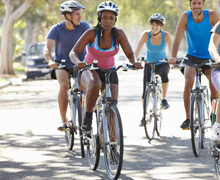
Chances are gut health is not high on your list of expected benefits from exercise, but new research suggests maybe it should be. Scientists from Australian Catholic University and the Hudson Institute of Medical Research discovered that regular physical activity supported what they called "cross-talk" between skeletal muscles and gut microbiota that demonstrated the ability to boost immunity.
The report published in the journal Gastroenterology shows exercise is able to boost diversity in the microbiome which then can provide a level of protection against many metabolic diseases.
"We now know that during exercise, the working muscles release small proteins into the blood which then circulate and 'communicate' with other organs and tissues," said professor John Hawley. "The exciting part is that we now realize that skeletal muscles don't just 'talk' to fat and bone tissue, but they also communicate with the gut microbiome.
"I can't think of anything that exercise is not good for but the link between exercise and the gut microbiome is new and the more we find out about it, the more exciting it is."
Hawley is a leading expert in the field of exercise and nutrition and he believes future research will reveal new breakthroughs in the area of the muscle-gut axis in the same way discoveries in the gut-brain connection have been made in the past few yeas. He said the key to these connections is the release of myokines which facilitate interorgan communication.
Researchers hope these findings are able to benefit those who suffer from gut disorders like inflammatory bowel disease.
"We know there is huge variation in the human gut microbiome, but it's equally true that reduced microbial diversity is a factor in several diseases of the gastrointestinal (GI) tract, systemic immune diseases, and cancers," said study co-author Edward Giles, a pediatric gastroenterologist and associate professor.
"Physical activity boosts host immunity, facilitates a more diverse gut microbiome and functional metabolome, and plays a positive role in energy homeostasis and metabolic regulation."
Giles said when it comes to GI disorders, the impact of exercise is diminished when exercising in the heat. "Heat appears to be a limiting factor—beyond a certain temperature the body sends less blood to the muscles and any time there's this 'fight for blood flow' the gut tends to lose out."
Hawley said athletes have a greater diversity in their gut microbiome than the general population, but he is unsure of what types and how much exercise is needed to trigger favorable changes. He said, however, the amount of exercise needed by those just beginning to exercise is probably quite small.
"Of course, you have to take into consideration a person's diet in all of this and, as the saying goes, you can't outrun a bad diet," Hawley said. "The bottom line is if you're not exercising, you should be. Will it have a beneficial effect on the gut microbiome? Absolutely. Will it have a beneficial effect on almost everything else? Absolutely."
